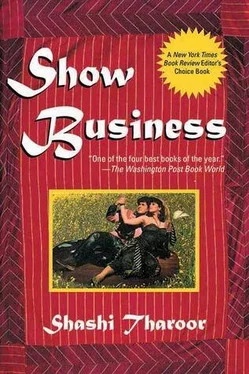“After all the trouble they took to be elected to Parliament,” I innocently ask a pair of fellow MPs once, “why do they walk out of it so often?” An Opposition MP gives me a lecture on the importance of the symbolic gesture of protest, but the effect is rather ruined by a cynical colleague who asks why walkouts only occur after the exiting MPs have signed the attendance register that ensures their daily fee.
I’m out of place in this world. I clap my hands to applaud the PM; the other MPs thump their desks. I patiently wait for a speaker to finish; the others heckle and jeer and interrupt anything I try to say. I don’t know the difference between a starred question and an unstarred one or how to go about asking either; the others (those who count, anyway) can cite thirty years of precedents and use Robert’s Rules of Order the way a makeup man uses a handkerchief. I’ve been assigned to the Consultative Committee to the Ministry of Information and Broadcasting, but it’s never convened; the other MPs are bringing officialdom to book in the Public Accounts Committee or wangling foreign trips to inspect the use of Hindi — the national language, after all, not to mention the vehicle of my fame — in India’s diplomatic missions abroad. I can’t cope; and what’s more, I’ve come to realize I don’t care.
I look around me at my fellow-backbenchers in this teak-paneled sanctum of national legislation. Some snore sonorously, undisturbed in the innocence of their ignorance. Others are awake, but equally immune to contamination by ideas. The most knowledgeable are the most powerless: the members of the Opposition, one of whom said to the PM in frustration the other day, “We have the arguments, but you have the votes.” That is the ultimate clincher in parliamentary democracy: the irrefutable logic of numbers. How does the quality of the debate matter, if you can win by the simple issue of a three-line whip? The MPs are herded in to vote: what they do before and after is of little concern to the party bosses. The air around me is heavy with lugubrious inattention. I get up, unnoticed except by teenagers in the gallery whose dupattas rustle in dismay at my departure. I leave and wish I did not have to return.
“I’m bored,” I confess to Cyrus Sponerwalla, who has come to Delhi in the line of duty to see me. “I don’t know how long I can stand this life.”
Cyrus perspires less in the dry heat of the capital, and his bulk seems to take up less space in the larger, airier rooms here. His tone is correspondingly milder, his ideas more ingenuous. “If you can’t do much in Parliament, man,” my PR man advises me, “use your position there to do something outside it, like. This is a great public relations opportunity, man.”
“Oh, yeah?” I ask. His dated Americanisms are infectious. “Like what?”
“Well, when MGR was elected to the Tamil Nadu State Assembly and didn’t have much to do, like, he distributed free raincoats to all the rickshawallahs of Madras during the monsoon, so they could go about their business without fear of getting wet. And,” he ends lamely on seeing my expression, “without catching a chill.”
“Well, thanks very much for the helpful suggestion,” I reply, making no effort to keep the sarcasm out of my tone. “My district happens to be in its third year of drought. I’m sure they could think of all sorts of useful things to do with a raincoat.”
“It’s just an idea, like,” Cyrus says defensively. “You could do something else, sorta situation-specific. We could come up with another gimmick, something different, idea-wise.”
“Yeah,” I respond heavily. “Like an umbrella, perhaps?”
“Yeah,” Cyrus is enthusiastic. “Free umbrellas. With your picture on ’em. Or maybe the party symbol. Let’s see, man…”
“Sponerwalla.” My tone is warning. “You’re getting carried away. Umbrellas? In a drought?”
His three faces fall simultaneously. “They could keep the sun off their heads,” he suggests weakly.
“Or they could be applied with force to the posteriors of anyone who tries to distribute them. Talk sense, Cyrus. That’s what I pay you to do. And speaking of payment, who’d pay for all this? A few lakh raincoats or umbrellas or for that matter plastic buckets don’t come cheap.”
Cyrus ponders this. “The party?” he suggests. I shake my head. “Some rich businessman?”
“In exchange for what?”
“Surely there are some favors you could do a businessman? Putting in a word with a minister?”
“I cant do myself any favors here, let alone anyone else,” I retort. “Even if I can put in a word, why should a minister pay any heed?”
“Because you’re Ashok Banjara,” the Bombay man says confidently.
“That, Cyrus,” I sadly tell him, “is no longer enough.”
In fact, it’s actually better these days to be Abha Patel. She has given up the films, traded backless cholis and slinky dresses for heavy silk saris, let her hair run to gray (and tied it up in a businesslike chignon), and been elected to Parliament in a landslide. She hasn’t got a portfolio either, but she is heading so many committees and forums on women’s issues and doing it all so visibly that no one dare embark on anything that relates even tangentially to women without consulting her first. Under her high-necked and long-sleeved blouses she still sports her falsies, if only for consistency, but it’s her voice people are interested in these days. There are moments when I’m tempted to go to her for advice again. But too much water has flowed under too many bridges since the last time.
Cyrus leaves, but not before asking me to help a nephew get into the Planning Commission Secretariat. I tell him I didn’t even know there was a Planning Commission, let alone a Secretariat for it. He assures me there is, and that it would benefit immeasurably from the talents of a Darius, or possibly Xerxes, Sponerwalla. Wearily I tell him I will see what I can do. I am learning the vocabulary of political Delhi.
But I am still not at home here. Quite literally, in fact: they have yet to allot me a house because the previous occupants of official residences, usually defeated MPs, are traditionally slow to vacate them. So I am based — having refused to live at my father’s — in something called a hostel. It is only marginally better appointed than the dressing rooms at Himalaya Studios, and I have resolutely resisted getting used to it. Not that I need to. Subramanyam has found me a posh farmhouse in the suburbs, complete with air-conditioners, swimming pool, and more Italian marble than Michelangelo would have known what to do with. It’s called a farmhouse to get around the zoning restrictions, but there isn’t a cow in sight and the only agriculture practiced in the vicinity is landscaping. I was pleased, but Ashwin threw up his hands in horror at the thought of my living there. “The occasional Sunday brunch with intimate friends, perhaps,” he said, “but live there? You’ll destroy everything we’ve said about you in the constituency and confirm Sugriva Sharma’s worst exaggerations. You’ve got to live somewhere more fitting, Ashok-bhai. A standard government bungalow like any other MP. Or stay with us.” He was careful not to say “with Dad.“
“I guess you’re right about the farmhouse,” I conceded reluctantly, “but I’m not staying with Dad. I’ll wait it out in the hostel. I’m hardly here anyway.”
This is true. Whatever my political importance or relative lack thereof, I am still in great demand at receptions and parties of every sort and return to my TOA (“temporary official accommodation”) only to sleep. Maya is in Bombay most of the time anyway; she thinks it would be too disruptive to pull the kids out of their school. In any case I have the parliamentary fringe benefit of free domestic air travel and can always use it to meet my domestic obligations. Frankly, I don’t mind the separation too much. I can be away from Maya without feeling guilty about it: after all, I’m sacrificing family life in the national cause. As the triplets grow (without somehow managing to grow up), it is a sacrifice I am increasingly willing to make. They are all of ten or thereabouts, and the house is already littered with cassette tapes, love comics, costume jewelry, and pinup posters of British pop stars and Pakistani cricketers. God knows who or what they will seize on when they enter their teens.
Читать дальше












